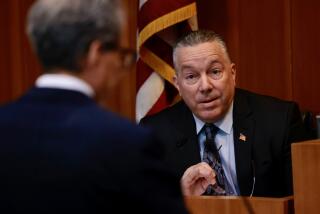Only Employers Can Be Sued for Harassment, Justices Rule
- Share via
In a decision that some critics contend will let offenders off the hook, the state Supreme Court ruled Thursday that sexual harassment victims can sue their bosses--but not their colleagues--for improper workplace behavior under California’s primary antidiscrimination law.
The court unanimously found that the state Fair Employment and Housing Act “imposes on the employer the duty to take all reasonable steps to prevent this harassment from occurring in the first place and to take immediate and appropriate action when it is, or should be, aware of the conduct.”
But, the court stated, “it does not also impose personal liability for harassment on nonsupervisory co-workers.”
The decision, written by Justice Ming W. Chin, added that if the Legislature wants to make individual co-workers legally liable in sexual harassment claims, it can amend the law.
The case involved a state Department of Corrections warehouse worker in Chino who contends that a colleague sexually harassed her verbally and physically for six months in 1994. The plaintiff, Maryann Carrisales, filed a pending Superior Court suit against the department, two of her supervisors and Dave Selkirk, her accused harasser.
In reviewing the case, the high court considered only whether Selkirk, as a co-worker, was liable. Although the justices found he was not, Carrisales’ lawyer said she will continue to press her case against the corrections department.
But the lawyer complained that the ruling robbed victims of a major weapon against harassers.
“It’s a bad decision both for employers and victims,” said San Mateo attorney William C. Quackenbush. “The only ones who clearly win under this decision are employees who decide to sexually harass their co-workers.”
He further noted that because the law says that an employer taking immediate corrective action to stop harassment by a nonsupervisory worker is not liable, there now will be cases in which no party can be held accountable under the employment act.
But the justices and others pointed out that a victim can still file a personal tort action against a co-worker, alleging infliction of emotional distress or invasion of privacy. Indeed, Quackenbush said, his client will do that.
Selkirk’s attorney, Kathleen A. Stosuy of Palm Springs, praised the ruling.
“It obviously clarified the point in the statute that didn’t need clarifying. I thought it was pretty clear from the get-go.”
As for the decision’s impact, Stosuy remarked, “I think it’s going to have the opposite effect of what the plaintiff was claiming.
“It sends a message that it is the employer who’s going to be liable,” she said. “So as the employer they have the best resources and motivations to prevent harassment and stop it. In no way does it give anyone license to harass.”
Selkirk, who is now retired, denies the allegations. “It’s a combination of misunderstanding in some instances and, in a lot of instances, two different versions of what occurred,” Stosuy said.
The state attorney general’s office filed a court brief in support of Carrisales’ arguments, and a spokeswoman said the Supreme Court ruling eliminated “what many saw as an important deterrent against harassment in the workplace.”
While stopping short of criticizing the decision, Assemblywoman Sheila Kuehl (D-Santa Monica), chairwoman of the Assembly Judiciary Committee, said she did not think the court “gave full play to the intention of the Fair Employment and Housing Act but rather parsed the words closely to give a somewhat cramped interpretation.”
“Frankly the notion that the one who caused all the trouble is the one to escape responsibility has got to be unfair,” Kuehl said.
Observing that a number of forms of sexual harassment may not be actionable in tort cases, Kuehl added that it is possible that the Legislature will look into “clarifying” the application of tort law to such cases.
Kuehl nonetheless said the ruling was not that much of a hurdle to plaintiffs, because employers are generally the primary target of harassment claims. “I don’t think it hurts plaintiffs at all because the deep pocket has always been the employer.”
The decision did not specifically address the issue of whether supervisors can still be sued for harassment under the employment act, but several attorneys said supervisors remain liable under the ruling.
More to Read
Sign up for Essential California
The most important California stories and recommendations in your inbox every morning.
You may occasionally receive promotional content from the Los Angeles Times.














